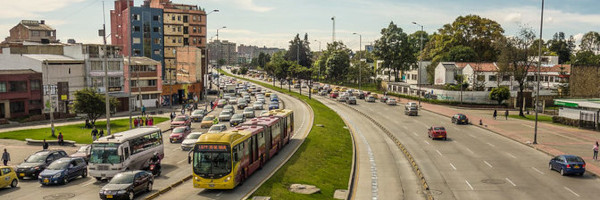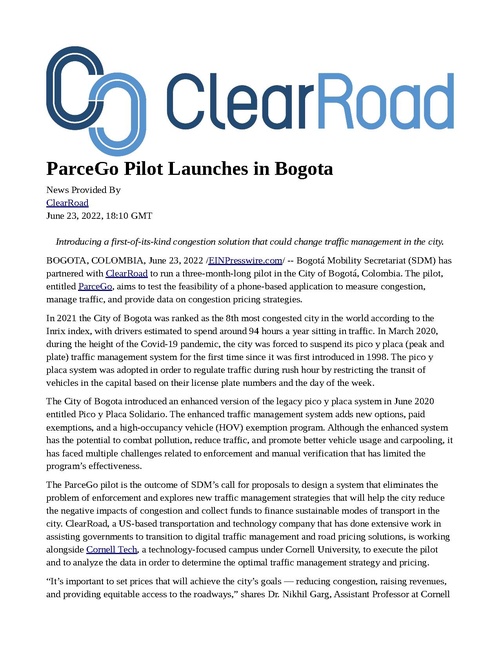ParceGo Pilot Launches in Bogota
| News | |
| Image | 
|
|---|---|
| Published | 2022-06-23 |
| Point(s) of Contact | Frederic Charlier |
| Organization(s) | ClearRoad |
| Where | Bogota Colombia |
| Display | Yes |

| |
Bogotá Mobility Secretariat (SDM) has partnered with ClearRoad to run a three-month-long pilot in the City of Bogotá, Colombia. The pilot, entitled ParceGo, aims to test the feasibility of a phone-based application to measure congestion, manage traffic, and provide data on congestion pricing strategies.
In 2021 the City of Bogota was ranked as the 8th most congested city in the world according to the Inrix index, with drivers estimated to spend around 94 hours a year sitting in traffic. In March 2020, during the height of the Covid-19 pandemic, the city was forced to suspend its pico y placa (peak and plate) traffic management system for the first time since it was first introduced in 1998. The pico y placa system was adopted in order to regulate traffic during rush hour by restricting the transit of vehicles in the capital based on their license plate numbers and the day of the week.
The City of Bogota introduced an enhanced version of the legacy pico y placa system in June 2020 entitled Pico y Placa Solidario. The enhanced traffic management system adds new options, paid exemptions, and a high-occupancy vehicle (HOV) exemption program. Although the enhanced system has the potential to combat pollution, reduce traffic, and promote better vehicle usage and carpooling, it has faced multiple challenges related to enforcement and manual verification that has limited the program’s effectiveness.
The ParceGo pilot is the outcome of SDM’s call for proposals to design a system that eliminates the problem of enforcement and explores new traffic management strategies that will help the city reduce the negative impacts of congestion and collect funds to finance sustainable modes of transport in the city. ClearRoad, a US-based transportation and technology company that has done extensive work in assisting governments to transition to digital traffic management and road pricing solutions, is working alongside Cornell Tech, a technology-focused campus under Cornell University, to execute the pilot and to analyze the data in order to determine the optimal traffic management strategy and pricing.
“It’s important to set prices that will achieve the city’s goals — reducing congestion, raising revenues, and providing equitable access to the roadways,” shares Dr. Nikhil Garg, Assistant Professor at Cornell Tech, “ To set these congestion prices, we need to know how people will react to the prices: will they pay, change their route, or change their trip? And it’s especially important to understand how people will differ in their responses.”
During the three-month pilot happening from April to July 2022, participants are asked to record all their trips using the easy-to-use ParceGo app. The app will measure overall usage and gather data on driving behaviors in identified congestion zones and main roads that have been selected by the city. An incentive scheme is currently being run to encourage app usage among volunteers and is intended to provide data that will help determine optimum incentive and pricing schemes.
“Our hope in participating in the pilot is to understand these questions [on pricing and behavior], and to develop the technical tools needed to provide better congestion pricing in the future,” says Dr. Garg. To date, the pilot has received over 2,530 applications with 1,377 identified eligible users; 244 users were eventually selected to participate in the pilot. Eligible participants had to be at least 18 years of age, Android smartphone users, and vehicle owners. All types of vehicles were permitted to apply, including small trucks and commercial vehicles, in order to accurately capture the diversity of trips and vehicles that usually take place in the city.
Future development of the ParceGo app is envisioned to include features that allow users to sign-up or pay for exemptions, as well as digitally verify vehicle occupancy for HOV exemption. Aside from determining optimal pricing, the pilot hopes to demonstrate the effectiveness of a phone-based app as a means for traffic management and for gathering congestion data. ClearRoad CEO, Frederic Charlier, is enthusiastic: “ParceGo is the first of its kind that explores alternative ways to implement congestion pricing. It’s promising because it shows that we can implement sophisticated and forward-thinking traffic management approaches by adapting them to the local context and taking advantage of affordable technologies already in the hands of Bogota residents. We don’t have to settle for legacy systems, we just need to be a little more creative.”
At the end of the pilot, ClearRoad and Cornell Tech will submit a report to SDM regarding the success and shortfalls of the technology and the feasibility of adopting a phone-based app as a means for traffic management and enforcement. The report will also include an analysis of driving behavior and suggested incentive or pricing models that the city can utilize to achieve its goals of reduced congestion and reduced pollution and GHG emissions that will ultimately improve the lives of its citizens.
Learn more about ClearRoad at https://www.clearoad.io or email us at contact@clearroad.io
Learn more about Cornell Tech at https://tech.cornell.edu/ or email us at news@tech.cornell.edu
ClearRoad, Inc.
contact@clearroad.io